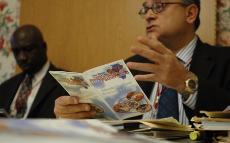Fathers help decrease crime rate

Attorney Jeffery Leving speaks during the Illinois Council on Responsible Fatherhood Symposium Saturday afternoon in the Union. The Council, sponsored by Gov. Blagojevich, is oriented toward developing public awareness of the role of a responsible, suppor Amelia Moore The Daily Illini
November 6, 2006
Ed Scott attended the “Illinois Council on Responsible Fatherhood” symposium in the Illini Union Saturday afternoon because he feels that programs that promote positive relationships between fathers and their children are important.
Scott, the director of the Child Welfare Agency in Jacksonville, Ill., helps imprisoned fathers become involved in their children’s lives – a good thing, he says, because parental involvement can sometimes be a factor in decreasing the high rate in which criminals return to prison.
“I’m always looking for resources,” Scott said, who believes society needs to change the way men are viewed as parents. “I think (the Council) has great potential.”
The Illinois Council on Responsible Fatherhood was created in 2003 to make social policy that significantly increases the number of children growing up with an involved and responsible father. Approved by Gov. Rod Blagojevich, the council supports local fatherhood groups and assists fathers in finding resources for employment, health issues, literacy and building family relationships.
“We’re trying to have meetings so every region in the state results in creating a network,” Jeffery Leving, attorney and chairman of the council said. “We’re hoping that some people will meet regularly and communicate with us so we can effectuate change in Central Illinois.”
Get The Daily Illini in your inbox!
Children who do not grow up with their biological fathers are more likely to be poor, sexually abused, have emotional and behavioral problems and use drugs, Leving said.
Children whose fathers have chosen to not be in their lives, versus children whose fathers have died, also tend to have more emotional damage, said Kristine Kelly, associate professor in psychology at Western Illinois University.
Leving agreed and followed up with an example.
He met a prisoner who felt that he was doing the right thing to stay out of his daughter’s life.
“But by abandoning her, he is increasing the likelihood that she will engage in criminal activity as he had done,” Leving said. “So, it’s a very unfortunate and scary situation that really needs to be corrected by focusing on rights and responsibilities.”
There are also gender biases that make men feel unwelcome in their child’s life, Leving said.
Leving remembered an incident where he walked with other male parents and their children to school as a support system. The principal was immediately alarmed when he saw the group and called the police.
“Men are not viewed as parents, especially in education,” he said.
The council focuses on both parents, noting that most family programs are geared only toward mothers.
Dorress Garbutt, an educator for the Fatherhood Initiative Program in the Champaign Mental Health Center, meets weekly with fathers as young as 15 years old and as old as 48 to strengthen their bond with their children in order to prevent abuse and abandonment.
“Sometimes fathers are left in the dark,” he said. “They may not know how to properly hold, feed or comfort the child.”
Garbutt said he was a foster child and knows the difficulties of growing up without a father. He is inspired to help motivate men to become good fathers.






